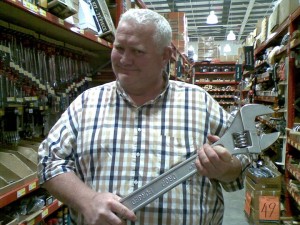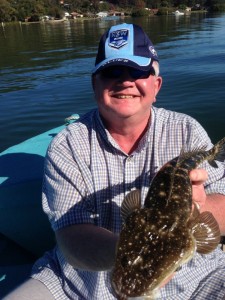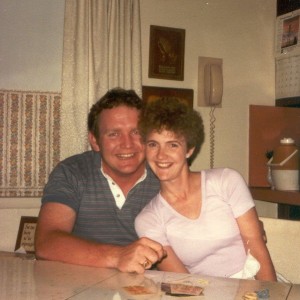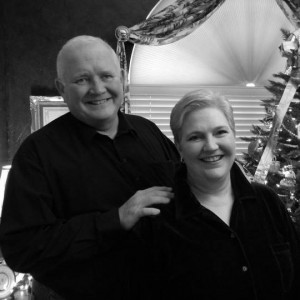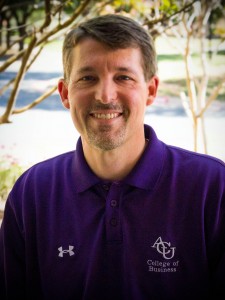Spotlight on Ian Shepherd
What is your educational background?
DA, Middle Tennessee State Univ, 1998.
Major: Economics
MBA, Belmont University, 1989.
Major: Business Administration
BBus, University of Western Sydney, 1987
Major: Marketing
Mcert, Blacktown Technical College, 1982
Mitchell High School, Blacktown, N.S.W. Australia, 1975
(All my degrees after high school were done part time while working full time.)
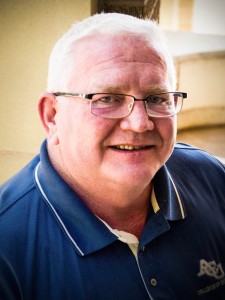
Dr. Ian Shepherd
What is your work background?
Partner, One Pulse. (May 2010 – Present).
Vice President of Operations, Gradeslayer Inc. (October 2005 – Present).
Professor Management Sciences, Abilene Christian University. (2003 – Present).
Associate Professor and Department Chair, Harris College of Business, Faulkner University. (2002 – 2003).
Vice President, Aussie Delivery Services. (July 2006 – Present).
Director of Finance, New Horizons. (June 2007 – May 2009).
Assistant Vice President, Logistics Systems, INGRAM BOOK GROUP. (2001 – 2002).
Assistant Vice President, Consumer Direct Fulfillment, INGRAM FULFILLMENT SERVICES. (1996 – 2001).
Director of Purchasing Operations, INGRAM BOOK COMPANY. (1991 – 1996).
Marketing Research Manager, Dollar General Corporation. (1987 – 1988).
Materials Controller, Alcan Australia Limited. (1978 – 1987).
Inspectors Clerk, New South Wales Police Department. (1976 – 1978).
Hole digger, Metropolitan Water Sewage and Drainage Board (1975)
What do you teach at ACU?
Undergraduate:
• Macroeconomics
• Microeconomics
• Managerial Economics
• International Business
• Operations
Graduate:
• Leadership
• Economics Boot Camp
• Organizational Behavior
• Human Resource Management
What committees/other duties do you have at ACU aside from teaching?
UGEC
What drew you to teaching? Why did you want to work with students?
I have always wanted to teach at the college level. I just had to get ready to do so.
What’s the best part of working with students?
Seeing that look when someone really gets what you are talking about.
Have you ever given up any big opportunities to keep working with students?
50% pay cut to teach.
Lived away from my family for a year to make the teaching profession happen.
Outside of teaching, what passions and hobbies do you have?
Home projects and fishing.
What is a good, early story about your teaching?
I try to use life experiences to get the importance of economic topics across to students. Here is one of my favorite class moments….
The work bag lesson!
It sits in my office.
It sits on my desk in plain view.
Sometimes it goes unnoticed.
Usually no one asks about it.
Today, however, its story was told to my 9:30 am Macroeconomics class. I would be talking about the value of work and how work changes the legacy of your family. I had no better example than what sat at the front of our class. For the entire class my dad’s work bag sat in front of my 100 students. Each student sat there wondering what was going on. I was about to tell them.
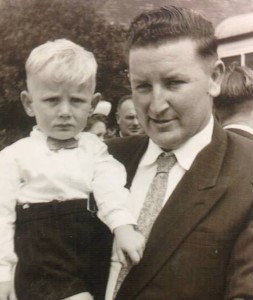
Ian and his father, Cliff Shepherd
Cliffy (Cliff Shepherd for those who did not know him) grew up in Kurrajong at the base of the Blue Mountains west of Sydney. A boy from the bush. He won awards for farming at the county and state shows and can be seen in the attached picture with a serious crop of corn almost 12 feet high. Growing up, dad only finished through the 8th grade. He was a good worker. He worked hard on his dad’s (Cecil’s) farm. I guess he would have stayed farming had he not met the young pretty girl Audrey at a church function. At first Auds (Audrey) did not like dad. She told us she threw stones at him to get him to go away. But as you all know, hate is love in disguise. The boy from the bush and the girl from Granville “Lell in Fove” and were married on New Year’s Eve 1955.
After completing his national service and marrying mum dad was offered a job at Alcan Australia Limited in Granville. It was nowhere near the bush and so different than anything dad had ever experienced. I would be lying if I didn’t tell you that it was mum’s father, Jim Byrnes (a manager at Alcan) that got dad the job. I guess he was looking out for his daughter, Audrey. The job was not a fancy job. It was a case maker. You nailed together boxes to ship the aluminium (yes that spelling is intentional my American friends) sheets, coil, or extrusions. It was (at this time) 6 days a week (5 full days and half day on Saturday).
My first memories of dad as a child were of waking very early on Saturday mornings. Other families would sleep in and enjoy the day, but not ours. At 5:30 am I would here rustling around in the kitchen. It was methodical. The fridge door would open. You would hear items being fumbled and stacked on the table in the darkness. You would then hear items being returned to the fridge. All the time dad would try to be quiet but not quite pull it off. Things would be dropped. Messes would be made. Noises were inevitable. Then you would hear the sandwich, fruit, and drink being placed in the squeaky work bag in preparation for the 6th work day of the week.
I would lay in bed complaining in my head about why this man was keeping me awake! Then I would hear the bag. He would picked it up and as he carried it out the door on the way to work its handle would squeak as it rocked back and forth with each step. Why! I would ask myself. Its 5:30 am when normal people were sleeping. It took fifty or so years for me to grasp what was going on. Each squeak of that handle on each of those 5:30 am mornings was teaching me a lesson. You do what you need to do to take care of your family.
This man, with an eight grade education would go through this routine every day of the week, except for Sundays, for most of his life. I never heard him complain about it. He just did it.
Over the next 45 to 50 years, that young bush boy got out of bed and took that lunch bag to his job. At first he hammered nails. He was good at it. He was also the kind of guy that people liked to be around so dad worked well with people. I can remember when they made him foreman and gave him his own shift to run. I remember when they made him warehouse supervisor in charge of inventory location and movement. I remember when they moved him to work in transportation. Finally, dad was running the warehouse, distribution and transportation nationally for Alcan. Each day, the same thing. Get up, go through the bag loading ritual, work hard, and care for your family. It did not matter that dad had only an eighth grade education. Having little education does not mean you’re stupid. Having no drive to care for your family is stupid, he would tell me. Dad always did what he said he would do. He had promised to care for his family, and for 45 or more years he did that every day without complaint.
When dad retired due to poor health, the bag was stored in the tool shed. It lay there for years gathering dust. I found it two years ago while cleaning out the shed and when Sue (my sister) asked if we should toss it I said no…! It meant too much to me. That day, the enormity of those 45 years of squeaky handle noises struck home.
As kids, we never wanted for anything. We were poor, but we were not in need. We went without, but we were never hungry. We had no TV, flush toilet, or carpet on the floor, but we laughed and loved. We had sheets for curtains and no heat in the house and yet it was a warm place for our family to gather. We played cricket down the driveway with the neighborhood kids and we drove old hand me down Holdens (Chevrolets).
When I look back now I can see his plan. You live your life to make the next generation’s legacy a better legacy than the one you were given. To do that, you have to work hard and be a consistent example to that next generation. The goal is to make things better. If that means hammering nails at 6 am on Saturday, then that is what I will do to make life better for my kids.
That boy from the bush raise three kids and loved his wife. Between them the three children have 8 degrees, the lowest of which is a master’s degree and one a doctorate. They are teachers, executives, and government servants, all with their own homes and families. Not a bad effort on Cliffy’s part if you ask me. Not bad at all.
So the boy from the bush who couldn’t rub two pennies together when he met mum had his story told in class today. As I sit here writing this tome after teaching that class I wonder if the students got the importance of what I was telling them. I can tell you what I got out of that class…..? I suddenly had the desire to be woken up at 5:30 am on a cold Saturday morning as that squeaky bag handle rattles its way to the back door for the ten thousandth time, but this time I get out of bed and I hug the man who made me who I am, and I thank him for what he did to make my life as easy as it is today. Good one Cliffy…good one…!
So what can we learn from this experience?
1. You sometimes don’t know what you’ve got until it’s gone.
2. Persistence makes perfect! Well, at least it teaches us to keep going.
3. What dad worked for took many decades to come to fruition. A good lesson for the “I want it now” generation in patience.
4. Do what you say you will do!
5. You will miss those annoying traits of your loved ones once they are gone.
6. You can’t make Devon (bologna) and sauce sandwiches quietly in the dark.
7. The rustle of a re-used bread bag to wrap a sandwich can frustrate small children.
8. I’d say “oil that handle,” but then I probably would not have had this story to tell.
Tell me about a project or accomplishment that you consider to be the most significant in your career.
The iPad initiative. Interview with CNBC on national television.
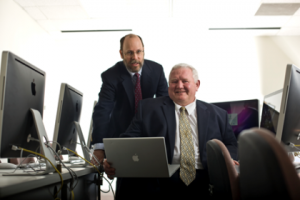
Brent Reeves and Ian Shepherd
Do you do any charity or non-profit work?
No, just regular church work.
Who is your role model, and why?
I have had two great men who have influenced me. The first is, my father, who taught me about life and the church and led by example. The second, my father-in-law who modeled continuing education and study to me.
Who was your most inspirational professor and why?
Most influential was a high school teacher at Mitchell High School in Blacktown in Australia. He taught business and commerce. His name was Max Wilson. He believed in me and made me feel like I could be successful at anything I put my mind to!
If you could have a superpower, what would it be and why?
Invisibility – so I can sleep all day and no one could find me.
What is something that students might be surprised to find out about you?
I slept with my current wife for 6 weeks prior to our wedding in Australia. Of course, I married her twice. Once in Stephenville TX for her side of the family. Then six weeks later for my side of the family in Australia. So, I have been married twice. To the same woman.
We have had three children, but only two are living now.
I played rugby and cricket in Australia.
I also played defensive lineman for the Argonauts in the Australian American Football League in Sydney, Australia.
I have written a humorous book of life stories entitled: “Life Lessons: A roadmap to surviving life’s twists and turns.” Available from Amazon.
- Ian and Dee Ann
- Ian and Dee Ann
What would you really want students and alums to know about you?
Born in Sydney in 1956 to Cliff and Audrey Shepherd, Ian spent the first six years of his life living in Granville, a working class suburb of Sydney, with his parents and grandparents. These formative years were spent mostly under the tutelage of his grandmother who provided day care while the rest of the family worked hard to get their own home built. Some of the early stories of his life date to this period and give an interesting insight into the mind of an active young Aussie with time on his hands.
In 1962 the family moved to their new home in Blacktown, a small outer rim suburb of Sydney that had just begun development. The author spent the next twenty-five years in this area completing high school and finalizing a degree in Marketing from the University of Western Sydney (Nepean). It was during these years that the importance of family and church were imprinted on his impressionable mind.
In 1979 Ian married a lifelong friend, Dee Ann Roper a missionary’s daughter, and took up residence in Marayong, a suburb of Sydney. After living and working in the area for nine years they made plans to further their education in America. In 1987 Ian and Dee Ann moved to Nashville Tennessee where they both entered school, Ian to complete his M.B.A. and Dee Ann to complete her Bachelor of Science degree in Music Education. It was during this time that Tabitha (1988), James (1990 deceased) and Ethan (1991) their children were born.
Ian spent many years working in industry in both Australia and the United States. In all his experience he was noted as having a unique sense of humor regarding the workplace and his home life. “After all,” Ian would say, “If I can’t laugh at the silly and stupid things I have done, my life would be pretty boring?” He is also known to tell a good story around the campfire.
After completing his M.B.A. Ian continued his education while working and in 1998 completed a Doctor of Arts degree in Economics from Middle Tennessee State University in Murfreesboro, Tennessee. In July of 2003, Ian moved to Abilene Texas where he is now a Tenured Professor in Economics and teaching online and in the new MBA program.
Ian calls himself a “humorist”, trying to see the funny side of all the events that befall us in life. His stories and humor reflect on the everyday man and his ability to find joy in the simplest of things, mainly his own stupidity.
Ian has lived in the USA for 29 years, but only this year did he become a US citizen. He waited to do so because of his mum (who passed away last year in Australia). His wife (Dee Ann) is a Senior CPA with Davis Kinard in Abilene Texas. Ian has two living children, Ethan Shepherd who graduated from ACU and is an HR Manager at Abilene Regional Hospital, and Tabitha Shepherd who graduated with her masters from the Boston Conservatory. Tabitha teaches in Oregon. Ian’s son, James died at birth.
Ian loves ACU and the environment in which the school molds young lives for Christian Business Service.
